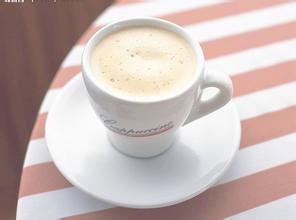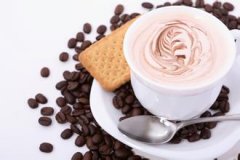A brief introduction to the treatment method of grinding degree and baking degree of slightly sour Cuban Crystal Mountain boutique coffee beans

Crystal Mountain Coffee is the most representative of "Cubita", the Chinese trademark "Amber". Adhere to the principle of perfect coffee, in order to ensure the quality of coffee, are picked by hand; in order to maintain the flavor of coffee, coffee beans are treated by washing; in order to show the excellence of coffee, coffee is roasted moderately and deeply. Cubita is like an elegant princess, with a feeling of natural tenderness, nobility, tenderness and elegance for women. Excellent balance, excellent combination of bitter and sour taste, there will be a meticulous, smooth, refreshing and elegant feeling when tasting, which is the best enjoyment of coffee.
Cubita is praised and affirmed by diners from all over the world, known as "unique Caribbean coffee" and "special coffee beans in island coffee beans". Yunyun Crystal Mountain Coffee is produced on the Crystal Mountain of Cuba, so it is called Cuban Crystal Mountain Coffee. Crystal Mountain Coffee is synonymous with top Cuban coffee, because this area not only grows coffee, but also produces quartz, crystal and other precious minerals. One of the remarkable features of Crystal Mountain Coffee is the size of the particles and the bright green color of the beans. Its flavor and taste features: full particles, uniform taste, with tobacco flavor. Crystal Mountain Coffee Bean is a typical island bean with a clean and delicate taste, slightly sour taste, not strong but very long-lasting, and with sweet melon and fruit aroma in 1748, coffee was introduced from domiga to Cuba, and Cuba has grown coffee ever since. With fertile land, humid climate and abundant Rain Water, Cuba can be called a natural treasure land for coffee cultivation. The suitable natural conditions provide a favorable natural environment for the growth of coffee trees, and coffee is well planted and developed here. In Cuba, the cultivation of coffee is regulated by the state. The best coffee growing area in Cuba is located in the Central Mountains. Because this area not only grows coffee, but also produces quartz, crystal and other precious minerals, it is also known as Crystal Mountain. At present, Crystal Mountain Coffee is synonymous with top Cuban coffee. One of the remarkable features of Crystal Mountain Coffee is the size of the particles and the bright green color of the beans.
In Cuba, most of the coffee beans are picked by hand. Coffee beans are picked about every half a month during the ripening period. During or after picking, coffee beans are classified and those immature and bad beans are removed to ensure the quality of the coffee. Cubans usually deal with coffee beans in two ways-tanning and washing. Tanning is the simplest, cheapest and most traditional way to treat coffee, which is to let the coffee fruit dry in the sun but not ferment. The general drying time is about four weeks. The washing rule makes the aroma of fruit more into the coffee beans, thus adding a kind of coarse fruit aroma to the coffee.
At present, Crystal Mountain Coffee is very precious. This is mainly for two reasons. The first reason is the economic sanctions imposed by the United States against Cuba and the non-opening up of Cuban imports. The second reason is that at present, Cuban coffee beans are mostly acquired by the French and Japanese markets, especially Japan, so it is difficult to buy coffee beans directly from Cuba. In spite of this, the status of Cuban coffee in the hearts of global coffee lovers can still be compared with Jamaican Blue Mountain Coffee.
Crystal Mountain Coffee beans are typical island beans with a clean and delicate taste, slightly sour taste, not strong but long-lasting, with sweet fruit aromas. The coffee made by it was owned by Jane in 1748, and coffee was introduced to Cuba from Domiga, and Cuba has been growing coffee ever since. With fertile land, humid climate and abundant Rain Water, Cuba can be called a natural treasure land for coffee cultivation. The suitable natural conditions provide a favorable natural environment for the growth of coffee trees, and coffee is well planted and developed here. In Cuba, the cultivation of coffee is regulated by the state. The best coffee growing area in Cuba is located in the Central Mountains. Because this area not only grows coffee, but also produces quartz, crystal and other precious minerals, it is also known as Crystal Mountain. At present, Crystal Mountain Coffee is synonymous with top Cuban coffee. One of the remarkable features of Crystal Mountain Coffee is the size of the particles and the bright green color of the beans.
In Cuba, most of the coffee beans are picked by hand. Coffee beans are picked about every half a month during the ripening period. During or after picking, coffee beans are classified and those immature and bad beans are removed to ensure the quality of the coffee. Cubans usually deal with coffee beans in two ways-tanning and washing. Tanning is the simplest, cheapest and most traditional way to treat coffee, which is to let the coffee fruit dry in the sun but not ferment. The general drying time is about four weeks. The washing rule makes the aroma of the fruit more into the coffee beans, thus adding a coarse fruit aroma to the coffee.
In Cuba, coffee cultivation is regulated by the state, and the best coffee growing area in Cuba is located in the Central Mountains. Because this area not only grows coffee, but also produces quartz, crystal and other precious minerals, it is also known as Crystal Mountain. At present, Crystal Mountain Coffee is synonymous with top Cuban coffee. Crystal Mountain is adjacent to the Blue Mountain Mountains of Jamaica, with similar climatic conditions, comparable to Jamaican Blue Mountain Coffee. Crystal Mountain is also known as "the Blue Mountain of Cuba".
Important Notice :
前街咖啡 FrontStreet Coffee has moved to new addredd:
FrontStreet Coffee Address: 315,Donghua East Road,GuangZhou
Tel:020 38364473
- Prev

Light sweet Cuban crystal mountain boutique coffee beans cultivation geographical location climate altitude brief introduction
Cubita has been praised and affirmed by diners from all over the world, known as the unique Caribbean coffee, the special coffee beans in the island coffee beans Yunyun Shuijing Mountain Coffee comes from the Cuban Crystal Mountain, so it is called Cuban Crystal Mountain Coffee. Crystal Mountain Coffee is synonymous with top Cuban coffee, because this area not only grows coffee, but also produces quartz, crystal and other precious minerals. Crystal
- Next

A brief introduction to the description of flavor, taste and aroma characteristics of Salvadoran coffee beans with balanced taste
Taste characteristics: sour, bitter, sweet mild bourbon is already the largest variety in the country, the national planting rate is as high as 60%, the fruit of Saguo bourbon has four colors of red and yellow orange with a small amount of pink bourbon. Pacamara, which belongs to large granule, is a new variety cultivated by Pacas and elephant bean. Pacamara originated in sa, but its output is much less than that of Bourbon. Sa Coffee Committee
Related
- Detailed explanation of Jadeite planting Land in Panamanian Jadeite Manor introduction to the grading system of Jadeite competitive bidding, Red bid, Green bid and Rose Summer
- Story of Coffee planting in Brenka region of Costa Rica Stonehenge Manor anaerobic heavy honey treatment of flavor mouth
- What's on the barrel of Blue Mountain Coffee beans?
- Can American coffee also pull flowers? How to use hot American style to pull out a good-looking pattern?
- Can you make a cold extract with coffee beans? What is the right proportion for cold-extracted coffee formula?
- Indonesian PWN Gold Mandrine Coffee Origin Features Flavor How to Chong? Mandolin coffee is American.
- A brief introduction to the flavor characteristics of Brazilian yellow bourbon coffee beans
- What is the effect of different water quality on the flavor of cold-extracted coffee? What kind of water is best for brewing coffee?
- Why do you think of Rose Summer whenever you mention Panamanian coffee?
- Introduction to the characteristics of authentic blue mountain coffee bean producing areas? What is the CIB Coffee Authority in Jamaica?

